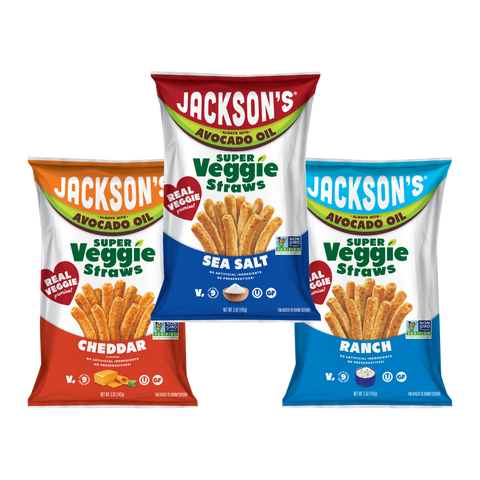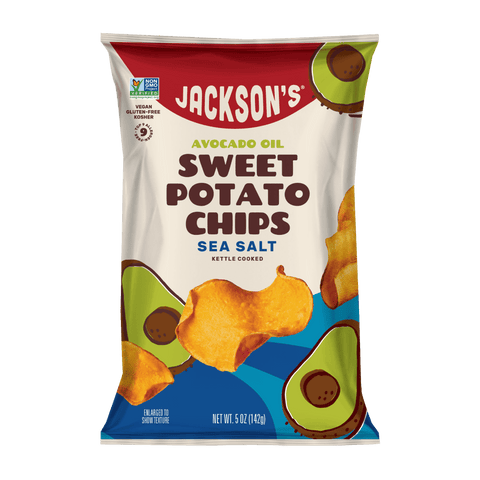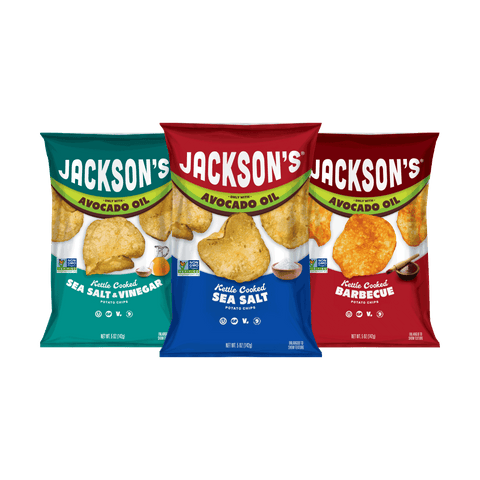What is Cassava? Your Complete Guide to This Amazing Root Vegetable

Ever wondered about that mysterious root vegetable you've been seeing in ingredient lists like our new Super Veggie Straws? Meet cassava - the versatile, nutrient-rich powerhouse that's been a dietary staple in many parts of the world for centuries. This fascinating root is making waves in the better-for-you food scene, and for good reason!
The Basics: Getting to Know Cassava
Cassava, also known as yuca (not to be confused with yucca), is a starchy root vegetable that grows in tropical and subtropical regions. Think of it as nature's underground treasure - a long, brown-skinned root with a stark white interior that's packed with potential.
But what does it actually taste like? Imagine a subtle, slightly nutty flavor with a starchy texture similar to potatoes. This mild taste makes it incredibly versatile in cooking, as it readily absorbs the flavors of whatever it's cooked with.
The Nutritional Powerhouse
Let's discuss what makes cassava truly special. This humble root vegetable packs quite a punch when it comes to wellness, making it much more than just a starchy carbohydrate.
- Rich in resistant starch
- Excellent source of vitamin C
- Naturally gluten-free
- Low FODMAP friendly
- Contains important minerals like manganese and potassium
The Beauty of Resistant Starch
Cassava is loaded with resistant starch, a unique type of carbohydrate that acts more like fiber than a typical starch, potentially supporting:
- Healthy gut bacteria growth
- Better blood sugar control
- Improved digestion
- Weight management
Vitamin C Champion
While we often think of citrus fruits as the vitamin C kings, cassava surprisingly holds its own in this department. One cup of cooked cassava provides about 28% of your daily vitamin C needs! This essential vitamin plays crucial roles in many areas.
A Gut-Health Hero
Speaking of digestion, cassava has become a favorite among those focusing on gut health. Its anti-inflammatory properties may help soothe digestive discomfort.
Plus, its low FODMAP status makes it an excellent choice for people with sensitive digestive systems.
FODMAP-Friendly Features
If you're following a low FODMAP diet or dealing with digestive sensitivities, cassava is your new best friend. It's naturally low in fermentable carbohydrates that can cause digestive distress in sensitive individuals.
The Gluten-Free Golden Child
For those navigating the gluten-free world, cassava is nothing short of miraculous. Cassava flour has become a game-changer in gluten-free baking, offering a texture remarkably similar to wheat flour. Unlike some other gluten-free alternatives, it doesn't have a strong taste that competes with other ingredients.
Mineral Magic
Cassava is like a natural multivitamin when it comes to minerals. Let's break down cassava’s mineral content:
Copper:
- Important for energy production
- Supports connective tissue formation
- Aids in iron absorption
- Helps maintain nerve cells
Manganese:
- Supports bone health
- Aids in wound healing
- Helps in metabolism
- Important for blood sugar regulation
Potassium:
- Essential for heart health
- Supports proper muscle function
- Helps maintain healthy blood pressure
- Aids in hydration balance
Benefits: Beyond Basic Nutrition
The benefits of cassava extend beyond its basic nutritional profile. Other benefits include:
- Anti-inflammatory properties
- Immune system support
- Antioxidant content
- Energy-sustaining carbohydrates
- Protein content (modest)
Foods with Cassava: A World of Possibilities
The culinary applications of cassava are many:
1. Traditional preparations:
- Boiled and mashed
- Fried into crispy chips
- Grated for fritters
2. Modern innovations:
- Cassava flour tortillas
- Gluten-free baked goods
- Cassava-based snacks like chips and straws
The Snack Revolution
The snack food industry has embraced cassava with open arms, creating innovative products that cater to wellness-conscious consumers. From crispy chips to crunchy straws, cassava-based snacks offer a better alternative to traditional processed snacks while maintaining that satisfying crunch we all love.
Cassava Flour: The Baker's New Best Friend
Cassava flour deserves special mention. Unlike tapioca flour (which is also derived from cassava but processed differently), cassava flour is made from the whole root and can often replace wheat flour in a 1:1 ratio in many recipes. This makes it an invaluable ingredient for gluten-free baking.
Safety Note: The Right Way to Enjoy Cassava
Here's something crucial to know: raw cassava contains compounds that can be toxic if not properly prepared. But don't let that scare you! When properly prepared and cooked, cassava is completely safe to eat. Always ensure you're buying properly processed cassava products or thoroughly cooking fresh cassava.
Why Cassava Deserves a Place in Your Life
Cassava is more than just another trending ingredient - it's a versatile, nutrient-rich food that offers something for everyone. Whether you're gluten-free, focusing on gut health, or simply looking to expand your culinary horizons, cassava deserves a place in your diet. From its impressive nutritional profile to its incredible versatility in cooking, this humble root vegetable has proven itself to be a true food superhero. Its rising popularity brings us innovative snacks and creative cooking applications, making it easier than ever to incorporate this wonderful root into our daily lives.
About Jackson's Super Veggie Straws™ (Made with Cassava!)

Our Jackson's Super Veggie Straws™ are always made with avocado oil. Never Seed Oils. Currently available in 3 flavors: Sea Salt, Ranch, and Cheddar. Made with real veggies, these super dippable snacks are packed with yellow peas, brown rice, cassava, and sweet potato. No empty potato starch filler here. Super Veggie Straws check all the right dietary preferences including: Vegan, Gluten-free, Kosher and Top 9 Allergen free. These aren't your ordinary veggie straws—they're SUPER!
No Seedy Oils Here
Avocado Oil Goodness Meets Irresistible Flavor - No Seed Oils Here!
-

 8 Pack New Arrival!Variety Pack Super Veggie Straws in Avocado Oil 5oz (Pack of 8)
8 Pack New Arrival!Variety Pack Super Veggie Straws in Avocado Oil 5oz (Pack of 8)Variety Pack
Super Veggie Straws in Avocado Oil
- Size
- 5oz bags
- Regular price
- $35.99
- Sale price
- $35.99
- Regular price
-
$35.99 (Liquid error (snippets/product-price line 131): divided by 0 per bag) - Unit price
- per
-

 8 Pack New Arrival!Sea Salt Variety Pack Snacks in Avocado Oil 5oz (Pack of 8)
8 Pack New Arrival!Sea Salt Variety Pack Snacks in Avocado Oil 5oz (Pack of 8)Variety Pack Snacks
Sea Salt in Avocado Oil
- Size
- 5oz bags
- Regular price
- $35.99
- Sale price
- $35.99
- Regular price
-
$35.99 (Liquid error (snippets/product-price line 131): divided by 0 per bag) - Unit price
- per
-

 8 Pack Best SellerSea Salt Sweet Potato Chips in Avocado Oil 5oz (Pack of 8)
8 Pack Best SellerSea Salt Sweet Potato Chips in Avocado Oil 5oz (Pack of 8)Sea Salt
Sweet Potato Chips in Avocado Oil
- Size
- 5oz bags
- Regular price
- $35.99
- Sale price
- $35.99
- Regular price
-
$35.99 (Liquid error (snippets/product-price line 131): divided by 0 per bag) - Unit price
- per
-

 8 PackVariety Pack Kettle Chips in Avocado Oil 5oz (Pack of 8)
8 PackVariety Pack Kettle Chips in Avocado Oil 5oz (Pack of 8)Variety Pack
Kettle Chips in Avocado Oil
- Size
- 5oz bags
- Regular price
- $35.99
- Sale price
- $35.99
- Regular price
-
$35.99 (Liquid error (snippets/product-price line 131): divided by 0 per bag) - Unit price
- per





